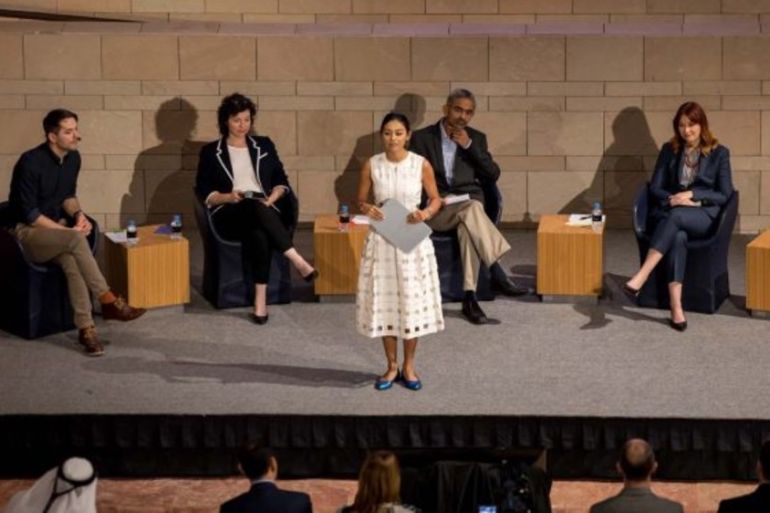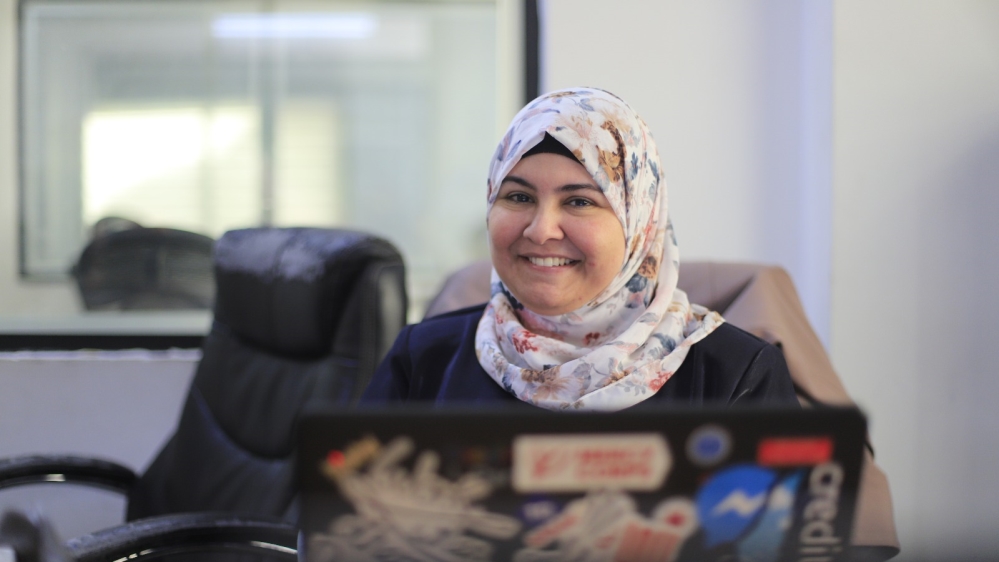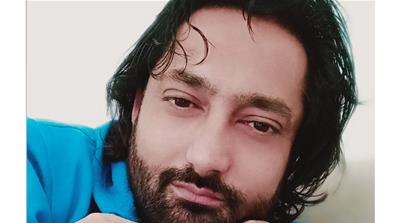Technology: Ushering in world peace or an existential crisis?
Al Jazeera speaks to experts and grassroots workers on whether tech is a force for good or a tool in hands of powerful.

Doha, Qatar – Can technology unlock world peace? A panel of leading global experts was asked the question at the Doha Debates forum held in Qatar last December.
The three experts – Allison Puccioni, Subbu Vincent and Ariel Conn – deliberated on whether technology will potentially play a role in helping usher in lasting world peace or create an existential crisis for humanity.
Keep reading
list of 4 itemsHong Kong’s first monkey virus case – what do we know about the B virus?
Why will low birthrate in Europe trigger ‘Staggering social change’?
The Max Planck Society must end its unconditional support for Israel
Speaking at the debate in Doha, Puccioni, a world-renowned practitioner of imagery intelligence, said the increasing use of technology has helped democratise information that will eventually “help create a more equitable world”.
“Today, we can access from our smartphones the kinds of information, that a few decades ago, was held only in the hands of the most clandestine echelons of elite intelligence agencies,” she told the audience in her opening remarks.
Is technology the key to world peace?
We teamed up with the UN to host a debate on this very question. We were joined by Tech Writer and AI Policy Specialist Ariel Conn, Media Ethicist Subbu Vincent and Imagery Analyst Allison Puccioni for this special edition of Doha Debates. pic.twitter.com/pVRHrA8wAH
— Doha Debates (@DohaDebates) December 19, 2019
A few years ago, Puccioni worked at a company where she was tasked with working with satellite imagery, YouTube videos, Twitter sentiment and other open-source information to track the Nigerian armed group Boko Haram.
“That sort of information before may have only part of intelligence agencies … but when the media has access, it has the capacity to hold governments accountable,” she added.
While it would be “impossible” to argue that challenges created by technology do not exist, Puccioni told Al Jazeera the availability of information to a larger audience is a good thing in the long run.
‘Putting ethics into technology’
Vincent, director for the Journalism and Media Ethics programme at Santa Clara University’s Markkula Centre for Applied Ethics, in the US, preferred to take the “middle road”.
“There’s always been grounds for optimism. But it’s been hyped up so much that people have forgotten that technology is really an amoral thing. It is designed without a moral sense,” Vincent added.
Vincent said that while technology has been used as a force for good, helping to mobilise people, it has also been used “to spread lies, disinformation and hate speech, amplify conspiracy theories, sow discord and divide people,” he told Al Jazeera.
“In the hands of good actors, it can be used for good. In the hands of bad actors, it will be used for bad,” he said.
‘Existential crisis’
The third participant in the debate, Conn, believes technology may have created an “existential crisis” for humans.
Conn, a former director of Media and Outreach for the Future of Life Institute, pointed out the connection between technology and warfare and how, throughout recent modern history, it has been used to bring about immense destruction.
“Technology is primarily developed for military prowess, for profit or both. And unfortunately, war is far more profitable than peace,” she said in her opening remarks.
Al Jazeera spoke to grassroots activists, tech workers and entrepreneurs to comment on the debate and how technology has impacted their work.
Dalia Shurrab, social media coordinator, Gaza

Dalia Shurrab, a social media coordinator in the occupied Gaza Strip, told Al Jazeera she agreed with Puccioni.
“As a person who is trapped under an unjust siege on the Gaza Strip, I used the internet and technology to be connected to the outer world, and I have so many chances to speak out, to represent my people and to express my opinion,” Shurrab said.
Gaza has been under an Israeli and Egyptian land, air and sea blockade since 2007, after Palestinian group Hamas won parliamentary elections in a move not recognised by its rival faction Fatah, leading to infighting within the coastal enclave that ended with Hamas running Fatah out of the Strip.
As a result, it has been extremely difficult for many Palestinians in Gaza to leave the coastal enclave, a situation which led the UN humanitarian chief to describe it as an “open-air prison”.
Shurrab works for the Gaza Sky Geeks (GSG), a tech hub in Gaza City that helps startups to grow their businesses outside of the coastal enclave of nearly two million people.
“We initiated our platform, SkyLancer Online to help people like Gazans who live under hard situations, to start learning how to be good freelancers using various freelance platforms and hunt jobs through social media platforms like LinkedIn and Twitter,” she told Al Jazeera.
“I am an optimistic person and always searching for hope … I can’t say that I disagree with Conn, but I prefer to think positively.”
Jillian C York, free speech activist, Germany
Jillian York, a free speech advocate based in the German capital of Berlin, highlighted the role of technology, particularly the internet, in amplifying the voices of marginalised communities such as LGBT.
“I think that technology is a double-edged sword in light of this [debate] question … Conn and Vincent both noted the downsides, but we also have to look at the ways in which technology, and specifically the internet, is facilitating global movements,” she noted.

“If you’re an LGBT person in a rural area or a conservative one, you might not think anyone shares your views/experiences. But online, you can find people who are like you, who share the same causes and who have lived similar lives,” York said.
On the other hand, she said she has “experienced first-hand how governments use technology – sometimes even that which was ostensibly built for good – to harm their citizens”.
So, while technology could certainly democratise information, it was important to note how states have abused technology to silence their own people, citing surveillance and facial recognition technology, York said.
Tahir Imin, Uighur activist, the US

US-based Uighur activist Tahir Imin pointed out how a lack of regulation has led to breaches of privacy and technology being used for mass surveillance.
Imin said that advanced tech companies, including US ones, helped China harvest data that was used for the surveillance and arrest of Uighurs.
“It’s a terrible feeling when a helpless people face a regime which is backed by the most advanced technology,” he said.
Imin believes it is important to note that some Western tech companies have “successfully pretended to be defenders of human rights and data privacy rights in the West” – while at the same time they “cooperated with authoritarian regimes like China”.
In the past year, Chinese authorities have come under criticism for applying facial recognition technology, particularly for identifying the members of the Uighur Muslim minority in Xinjiang province.
According to some estimates, up to a million Uighurs were moved to internment camps after they were racially profiled in Xinjiang and in other provinces.
“I, along with millions of other Uighurs, was forced by Chinese authorities to draw my blood, my face scanned, my voice recorded without knowing why and how they will use it,” Imin told Al Jazeera.
Nevertheless, despite his criticism of tech organisations, Imin said he was also optimistic about the future of technology which, he said, has also helped him to convey the voice of his people to audiences around the world to raise awareness around the issues of the Uighur minority in China.
Sarwar Kashani, Kashmiri writer based in New Delhi
For Sarwar Kashani, Puccioni sounded “unrealistically optimistic” on the idea that tech could lead to a more equitable world.
“I don’t think information technology will be used to unite humans, bring peace and augment democratic values. It is a myth that tech will ever be a peace enabler. Look at the people who are pulling strings,” he told Al Jazeera.
“They are modern-day Nazis, autocrats and conflict sellers,” he added. “FB, Google, Twitter and WhatsApp and other platforms are hand in glove with dictators masquerading as liberal democrats.”

In a recent controversy, social media giant Facebook has been criticised for not acting against a post by US President Donald Trump that appears to glorify violence in the wake of George Floyd protests.
A communications ban in Kashmir was gradually lifted from January, but a curb on internet speed remains to this day, despite a global pandemic.
After India revoked Kashmir’s autonomous status last August and placed a communications blackout across the disputed region, Kashmiris like Kashani suddenly were cut off from the outside world.
“Just imagine how tough it is to live without the internet in the 21st century,” he told Al Jazeera.
However, Kashani said, even if Kashmir had free access to the internet and social media platforms, censorship would be prevalent, and the voice of his people would remain curtailed.
“I have absolutely no hope even if India allows free access to social media in Kashmir,” he laments.
“You have a partial freedom on what you write on internet [Twitter, Facebook], but you have no control on what you read. Do you think the posts criticising the government disappear on their own? It is not being done by design,” he said.
Alima Bawah, entrepreneur, Ghana

Alima Bawah, a Ghanaian entrepreneur, says she is “1,000 percent” an optimist.
The former journalist said that a lack of basic necessities and conditions like hunger could often lead to conflict.
She says technology has, in this regard, improved people’s lives for the better, particularly in rural areas.
She co-founded Cowtribe, a company that provides “on-demand and subscription-based” animal vaccine delivery and other vet services to “last-mile” farmers, those at the end of the agricultural value chain, in Ghana.
Farmers can now access essential services like agronomic foods, vaccines and other veterinary services, she said.
According to the UN food agency, agriculture contributes to 54 percent of Ghana’s GDP, providing more than 90 percent of Ghana’s food requirement.
Priscilla Madrid, feminist activist, Mexico
Mexican feminist and writer Priscilla Madrid believes the main focus should be the people themselves, not necessarily technology.
Madrid says she has consistently witnessed how technology is used to violate the rights of women – such as men creating closed Facebook groups where they share pictures of women they have sexually harassed or assaulted, in addition to sharing tips on how to do it without being caught.

“Also, Mexico is also one of the main producers of child pornography in the world, which is shared throughout the world through technology,” she said, adding that she wouldn’t “blame cameras and the internet for that – I blame the people holding the camera”.
According to Mexican NGO Guardianes, 60 percent of the world’s child pornography was made in Mexico, a country that has one of the highest rates of physical violence against children under 14.
While Madrid said she found Vincent’s middle-of-the-road approach the most compelling, she felt more pessimistic about technology’s role in ushering peace.